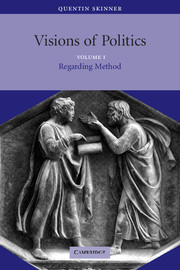Book contents
- Frontmatter
- Contents
- General preface
- Full Contents: Volumes 1–3
- Acknowledgements
- Conventions
- 1 Introduction : Seeing things their way
- 2 The practice of history and the cult of the fact
- 3 Interpretation, rationality and truth
- 4 Meaning and understanding in the history of ideas
- 5 Motives, intentions and interpretation
- 6 Interpretation and the understanding of speech acts
- 7 ‘Social meaning’ and the explanation of social action
- 8 Moral principles and social change
- 9 The idea of a cultural lexicon
- 10 Retrospect : Studying rhetoric and conceptual change
- Bibliography
- Index
6 - Interpretation and the understanding of speech acts
Published online by Cambridge University Press: 05 September 2012
- Frontmatter
- Contents
- General preface
- Full Contents: Volumes 1–3
- Acknowledgements
- Conventions
- 1 Introduction : Seeing things their way
- 2 The practice of history and the cult of the fact
- 3 Interpretation, rationality and truth
- 4 Meaning and understanding in the history of ideas
- 5 Motives, intentions and interpretation
- 6 Interpretation and the understanding of speech acts
- 7 ‘Social meaning’ and the explanation of social action
- 8 Moral principles and social change
- 9 The idea of a cultural lexicon
- 10 Retrospect : Studying rhetoric and conceptual change
- Bibliography
- Index
Summary
One of the most important of the many injunctions contained in Wittgenstein's Philosophical Investigations is that we ought not to think in isolation about ‘the meanings of words’. We ought rather to focus on their use in specific language-games and, more generally, within particular forms of life. Less than a decade after Wittgenstein threw down this epoch-making challenge, J. L. Austin picked it up by asking, in How to Do Things with Words, what exactly might be meant by investigating the use of words as opposed to their meanings, and what might consequently be meant by saying that words are also deeds. As I have already intimated in chapter 4, it has always seemed to me that, taken together, Wittgenstein's and Austin's insights offer a hermeneutic of exceptional value for intellectual historians and, more generally, for students of the cultural disciplines. I have already spoken in chapter 5 of one particular way in which their approach seems to me of value in helping us to think about the project of understanding utterances and interpreting texts. I should now like to enlarge on these earlier discussions, to respond to criticisms of them, and thereby to present my argument in a more systematic and wide-ranging style.
Wittgenstein and Austin alike remind us that, if we wish to understand any serious utterance, we need to grasp something over and above the sense and reference of the terms used to express it.
- Type
- Chapter
- Information
- Visions of Politics , pp. 103 - 127Publisher: Cambridge University PressPrint publication year: 2002
- 3
- Cited by



